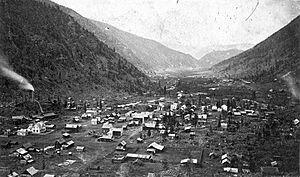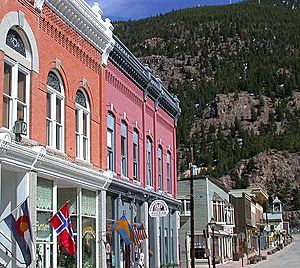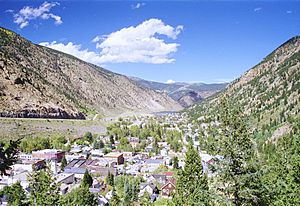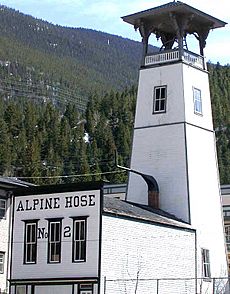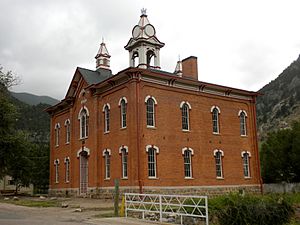Georgetown, Colorado facts for kids
Quick facts for kids
Georgetown, Colorado
|
|||
|---|---|---|---|
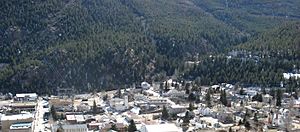
Georgetown as seen from Interstate 70.
|
|||
|
|||
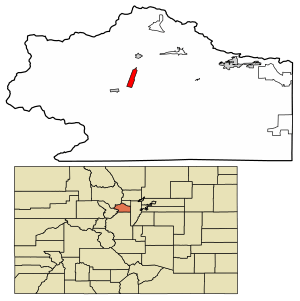
Location of the Town of Georgetown in Clear Creek County, Colorado.
|
|||
| Country | |||
| State | |||
| County | Clear Creek County | ||
| Established | 1859 | ||
| Incorporated | November 16, 1885 | ||
| Government | |||
| • Type | Territorial Charter Municipality | ||
| Area | |||
| • Total | 1.098 sq mi (2.845 km2) | ||
| • Land | 0.997 sq mi (2.583 km2) | ||
| • Water | 0.101 sq mi (0.262 km2) | ||
| Elevation | 8,521 ft (2,597 m) | ||
| Population
(2020)
|
|||
| • Total | 1,118 | ||
| • Density | 1,121/sq mi (433/km2) | ||
| • Metro | 2,963,821 (19th) | ||
| • CSA | 3,623,560 (17th) | ||
| • Front Range | 5,055,344 | ||
| Time zone | UTC−07:00 (MST) | ||
| • Summer (DST) | UTC−06:00 (MDT) | ||
| ZIP code |
80444
|
||
| Area code(s) | Both 303 and 720 | ||
| FIPS code | 08-29735 | ||
| GNIS feature ID | 0181892 | ||
| Highways | I-70 | ||
|
Colorado Territorial Charter Municipality |
|||
Georgetown is a historic town in Colorado, United States. It is the main town of Clear Creek County. In 2020, about 1,118 people lived there.
Georgetown started in 1859 during the Pike's Peak Gold Rush. It was a silver mining camp located along Clear Creek in the Rocky Mountains. Today, Georgetown is part of a special area called the Georgetown-Silver Plume Historic District. This district includes Georgetown, the nearby town of Silver Plume, and the Georgetown Loop Historic Mining & Railroad Park.
The town is high up in the mountains, about 8,530 feet (2,597 meters) above sea level. It's west of Denver along Interstate 70. Even though it's a small town now, Georgetown was a very important mining center in the late 1800s. It was even called the "Silver Queen of Colorado." Today, it's a popular place for tourists, especially in the summer. Many old buildings from its mining days are still standing.
Contents
Georgetown's Early Days and Silver Mining
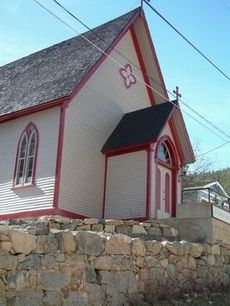
The area where Georgetown is now was first settled in 1859. Two brothers, George and David Griffith, found gold in Clear Creek. They decided to stay and mine there. In 1860, they formed the Griffith Mining District. Soon after, a group called the "Georgetown Company" claimed land for a town. The main street was called "Main Street."
Silver was discovered in the area in 1864. This discovery made Georgetown famous. A man named John Henry Bowman moved to Georgetown in 1885. He worked in the mines and later owned part of the American Sisters Mine, a silver mine. He and his wife, Lavinia, built a house in Georgetown that is now a historical site.
Their daughter, Mellie, later married John James White. He bought the rest of the American Sisters Mine. He also helped build a dam and power plant. John James White was a lawyer and even served as the Police Judge (like a mayor) of Georgetown from 1900 to 1902.
Growth and the "Silver Queen" Era
In 1868, Georgetown officially became a town. A few months later, it became the main town of Clear Creek County. The historic courthouse in Georgetown was built that same year. Georgetown is special because it's the only town in Colorado that still uses its original rules from when Colorado was a territory.
In the 1870s, a narrow gauge train track, the Colorado Central Railroad, was built. This helped Georgetown grow even more. Most of the old train tracks are gone now, but a part of it between Georgetown and Silver Plume is still used today. It's called the Georgetown Loop, and it's a popular tourist attraction.
Georgetown grew the most during the Colorado Silver Boom in the 1880s. It was one of the biggest mining towns in Colorado, almost as big as Leadville. At one point, over 10,000 people lived there! Some people even wanted to move the state capital from Denver to Georgetown.
However, the silver boom ended in 1893, and the town's population got much smaller.
Georgetown Today: A Tourist Destination
After the silver boom ended, Georgetown became much quieter. But in the 1950s, it started to become popular again. Many skiers would pass through Georgetown on their way to and from the mountains. Small shops began to open in the old 19th-century buildings.
By the late 1960s, a museum opened in one of the historic hotels. This made Georgetown a popular summer spot for tourists. Visitors could walk around and see buildings from the mining boom era. Today, Georgetown is still a great stop for skiers on Interstate 70. The town's hotels also host many skiers in the winter.
Georgetown has also been a filming location for movies and TV shows. For example, the TV movie The Christmas Gift, starring John Denver, was filmed there in 1986. Other movies like Switchback and parts of The Duchess and the Dirtwater Fox were also filmed in Georgetown.
In 2020, a dog named Parker was even sworn in as the honorary mayor of Georgetown!
Georgetown's Location
Georgetown is located in the valley of Clear Creek. Interstate 70 and U.S. Route 6 run next to the town. You can get to Georgetown from Exit 228 on I-70. It's about 45 miles (72 km) east to Denver. If you go 22 miles (35 km) west, you'll cross the Continental Divide and reach Silverthorne.
In 2020, the town covered about 1.1 square miles (2.845 square kilometers) of land and water.
Georgetown's Weather
Georgetown has a type of climate called a "warm-summer humid continental climate." This means it has warm summers and cold, snowy winters.
| Climate data for Georgetown, Colorado, 1991–2020 normals, extremes 1893–present | |||||||||||||
|---|---|---|---|---|---|---|---|---|---|---|---|---|---|
| Month | Jan | Feb | Mar | Apr | May | Jun | Jul | Aug | Sep | Oct | Nov | Dec | Year |
| Record high °F (°C) | 60 (16) |
62 (17) |
68 (20) |
76 (24) |
83 (28) |
92 (33) |
92 (33) |
89 (32) |
86 (30) |
81 (27) |
70 (21) |
62 (17) |
92 (33) |
| Mean maximum °F (°C) | 52.0 (11.1) |
51.9 (11.1) |
61.6 (16.4) |
65.9 (18.8) |
73.8 (23.2) |
83.9 (28.8) |
85.5 (29.7) |
82.4 (28.0) |
79.9 (26.6) |
72.7 (22.6) |
62.3 (16.8) |
52.1 (11.2) |
86.4 (30.2) |
| Mean daily maximum °F (°C) | 36.4 (2.4) |
37.7 (3.2) |
44.5 (6.9) |
49.8 (9.9) |
59.6 (15.3) |
71.7 (22.1) |
77.1 (25.1) |
74.5 (23.6) |
68.3 (20.2) |
56.7 (13.7) |
44.2 (6.8) |
36.3 (2.4) |
54.7 (12.6) |
| Daily mean °F (°C) | 25.9 (−3.4) |
26.5 (−3.1) |
32.8 (0.4) |
37.9 (3.3) |
47.1 (8.4) |
57.0 (13.9) |
62.9 (17.2) |
60.5 (15.8) |
53.8 (12.1) |
43.5 (6.4) |
33.0 (0.6) |
25.9 (−3.4) |
42.2 (5.7) |
| Mean daily minimum °F (°C) | 15.5 (−9.2) |
15.3 (−9.3) |
21.1 (−6.1) |
26.0 (−3.3) |
34.6 (1.4) |
42.4 (5.8) |
48.8 (9.3) |
46.5 (8.1) |
39.3 (4.1) |
30.3 (−0.9) |
21.9 (−5.6) |
15.4 (−9.2) |
29.8 (−1.2) |
| Mean minimum °F (°C) | −3.1 (−19.5) |
−5.3 (−20.7) |
3.4 (−15.9) |
13.2 (−10.4) |
20.9 (−6.2) |
33.1 (0.6) |
40.5 (4.7) |
37.7 (3.2) |
28.4 (−2.0) |
13.6 (−10.2) |
4.6 (−15.2) |
−5.0 (−20.6) |
−9.6 (−23.1) |
| Record low °F (°C) | −28 (−33) |
−25 (−32) |
−15 (−26) |
−8 (−22) |
7 (−14) |
24 (−4) |
31 (−1) |
29 (−2) |
8 (−13) |
−4 (−20) |
−16 (−27) |
−17 (−27) |
−28 (−33) |
| Average precipitation inches (mm) | 0.81 (21) |
0.90 (23) |
1.39 (35) |
2.33 (59) |
2.13 (54) |
1.54 (39) |
2.49 (63) |
2.18 (55) |
1.52 (39) |
1.25 (32) |
0.89 (23) |
0.86 (22) |
18.29 (465) |
| Average snowfall inches (cm) | 12.5 (32) |
12.6 (32) |
18.5 (47) |
20.9 (53) |
6.6 (17) |
0.2 (0.51) |
0.0 (0.0) |
0.0 (0.0) |
1.6 (4.1) |
7.5 (19) |
11.1 (28) |
14.4 (37) |
105.9 (269.61) |
| Average precipitation days (≥ 0.01 in) | 8.5 | 9.0 | 10.5 | 11.6 | 10.4 | 9.5 | 13.4 | 13.6 | 9.6 | 7.6 | 7.3 | 8.5 | 119.5 |
| Average snowy days (≥ 0.1 in) | 9.1 | 9.3 | 10.0 | 9.2 | 3.2 | 0.1 | 0.0 | 0.0 | 0.5 | 3.6 | 7.3 | 8.8 | 61.1 |
| Source 1: NOAA | |||||||||||||
| Source 2: National Weather Service (mean maxima and minima 2006–2020) | |||||||||||||
People of Georgetown
| Historical population | |||
|---|---|---|---|
| Census | Pop. | %± | |
| 1870 | 802 | — | |
| 1880 | 3,294 | 310.7% | |
| 1890 | 1,927 | −41.5% | |
| 1900 | 1,418 | −26.4% | |
| 1910 | 950 | −33.0% | |
| 1920 | 703 | −26.0% | |
| 1930 | 303 | −56.9% | |
| 1940 | 391 | 29.0% | |
| 1950 | 329 | −15.9% | |
| 1960 | 307 | −6.7% | |
| 1970 | 542 | 76.5% | |
| 1980 | 830 | 53.1% | |
| 1990 | 891 | 7.3% | |
| 2000 | 1,088 | 22.1% | |
| 2010 | 1,034 | −5.0% | |
| 2020 | 1,118 | 8.1% | |
| U.S. Decennial Census | |||
In 2000, there were 1,088 people living in Georgetown. There were 503 households, and 278 of them were families. About 24% of households had children under 18. Most people in Georgetown were White (about 96%). About 4% of the population was Hispanic or Latino.
The average age of people in Georgetown was 39 years old. About 19% of the population was under 18, and 8.2% were 65 or older.
Local Information
- Historic Georgetown: Centennial Gazette 1868−1968
See also
 In Spanish: Georgetown (Colorado) para niños
In Spanish: Georgetown (Colorado) para niños
 | William Lucy |
 | Charles Hayes |
 | Cleveland Robinson |





